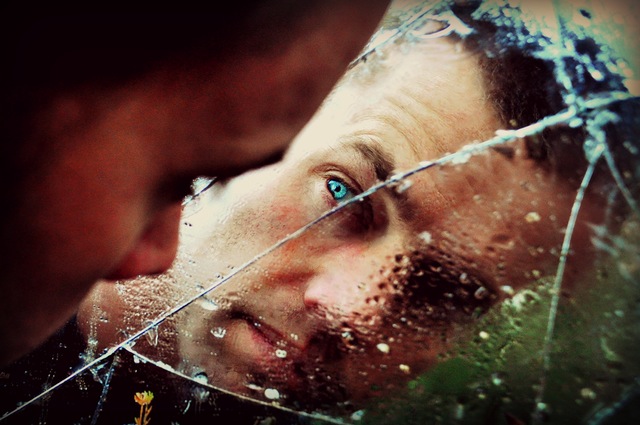I believe that we can learn something from everything that happens to us, including acne. And I’ve had many years’ worth of opportunities already, but it seems that I still have more to learn.
My own acne has never been severe, though I have often thought otherwise, and I’ve often made it worse by being particularly unkind to it.
The closer I look at my skin, the worse its condition appears and the more flaws I seem to discover. I can fall easily into the mental trap of someone with body dysmorphia—a condition characterized by finding excessive and obsessive flaw with a usually normal body part.
There are so many other acne sufferers out there who, like me, are obsessed with curing their “problem.” But here we see a first mistake: the assumption that acne is itself the problem—something bad or wrong or abnormal that causes suffering and which must above all be cured.
Yet, to truly experience freedom from suffering, we can’t fix all external conditions, no matter how hard we try; we can only change our reactions to them. (Easier said than done!)
At times, my struggle with my skin becomes one of not giving in to frustration. I wish for my skin to already be clear, and the fact that it is not leads me into mental states of distress and impatience.
At such times, my skin is teaching me to practice patience.
At times, I become envious of others’ success stories or naturally glowing complexions, and judge myself comparatively, wondering why they get to be beautiful and radiant when I am not.
At such times, my skin is teaching me to practice modesty and acceptance.
At other times, I become angry and fed up with new blemishes that disgust me—even small, unassuming blackheads or whiteheads—and it can become overwhelmingly tempting to give in to the urge to pick or scratch at the numerous tiny “flaws” on my face, which inevitably makes them worse again.
In these moments, I am trying to practice listening to my inner dialogue. What is going on in my mind as I feel the urge to “pick at myself?”
Nitpicking is the act of criticizing small, insignificant things, which I know is what I’m doing. But as the urge to pick grows stronger, a small and incredibly dangerous thought arises, so quiet and deep it is easy to miss. And I’ve often missed it; it’s only recently that I’ve grown quiet or willing enough to notice it consciously. That thought is:
But I don’t care.
I know it’s unhealthy, but I don’t care. I know it will make it worse, but I don’t care. I know it’s not significant, but I don’t care. I want it. I want to pick. I want to tell myself, See that little thing? That’s a problem. And by picking at it I prove it. It was a problem, but now that I’ve pulled it out and expressed my dissatisfaction, it’s gone and done with.
And I’m going to do it over and over and over again until I’ve gotten everything that is wrong with me out—forever—for good.
Only, it never gets it all out, and it never leads to healing. This is merely a perpetuation of a negative cycle. And this idea that “I don’t care” is concerning, and underlies, I expect, many forms of negative habitual cycles.
“I know it will hurt me to eat that, but I don’t care.” “I know it will hurt you if I say this, but I don’t care.”
In these moments, it occurs to me to ask: Whom am I addressing? Is it myself? Some subsumed authority figure from my childhood? Both?
“You can’t do that. It’s not good for you.”
“But I don’t care. I want to!”
Desiring self-harm is sometimes entangled with desiring perfection. Individuals who are perfectionists may learn self-anger toward that which they feel is imperfect, and then cling to their urge to express that anger, believing that it will help to bring them closer to an impossible, desired state—flawlessness.
So, I am flawed, and I can accept that. I do not want to hurt myself. I do care.
My skin is teaching me to internalize this on a deep level. And as long as that little voice is still saying at the height of my dissatisfaction, “I don’t care. I want to criticize you. You deserve it. You are imperfect,” I will not have learned what I need to learn from this experience.
As a Vajrayana Buddhist, I believe that on our deepest level we are all already perfect, enlightened beings, and the distance between suffering and enlightenment is measured by the time it takes us to wake up. Until I do wake up fully, however, the appearance of flaws persists, which means it’s time now to work on accepting them.
So next time I feel the urge to nitpick and criticize my appearance, I will try to remember to internalize a different kind of message to myself, one that may take time:
Because I care, I won’t hurt you. You don’t need to be perfect or other than what you are. Your acne is not a flaw or a punishment or an ugliness, but rather a reminder—to your own self, as well as to others—to be kind.
~
Relephant Read:
Wabi-sabi: Finding Beauty in Imperfection.
~
Author: Dalena Storm
Editor: Toby Israel
Image: Pexels
~
 Share on bsky
Share on bsky






Read 0 comments and reply